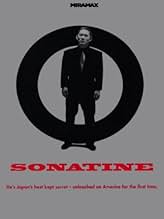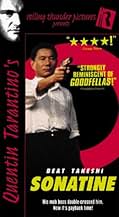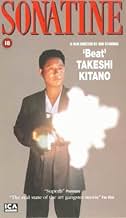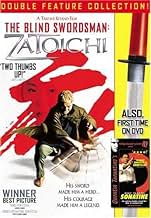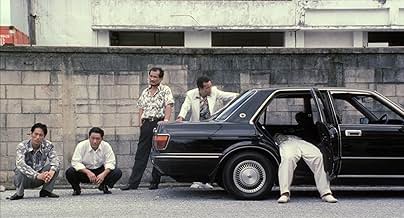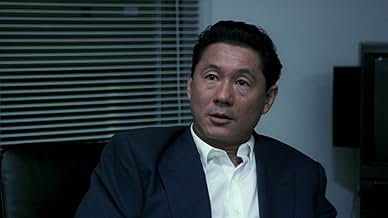Mehrere Yakuza aus Tokio werden nach Okinawa geschickt, um einen Bandenkrieg zu beenden. Der Krieg eskaliert daraufhin und die Tokioter Drifter beschließen, sich am Strand zu verstecken.Mehrere Yakuza aus Tokio werden nach Okinawa geschickt, um einen Bandenkrieg zu beenden. Der Krieg eskaliert daraufhin und die Tokioter Drifter beschließen, sich am Strand zu verstecken.Mehrere Yakuza aus Tokio werden nach Okinawa geschickt, um einen Bandenkrieg zu beenden. Der Krieg eskaliert daraufhin und die Tokioter Drifter beschließen, sich am Strand zu verstecken.
- Auszeichnungen
- 4 Gewinne & 1 Nominierung insgesamt
Empfohlene Bewertungen
I love how the only emotions Murakawa expresses are humor and nihilist apathy. The "sumo scene" is so delightfully out-of-place, while the ending simply leaves your mouth open. The warmth the characters show just makes it more hurtful when they meet such pathetic, low-key ends. I'm not an expert on Japanese society, but I see this film as a comment on the emptiness of a fear-filled culture of reservation, where it is more important to show restraint and respect than it is to continue living.
I'll still enjoy good ol' HK pistol operas, but I'll never see them quite the same again.
Some 18 months on and I still love the film and is certainly one of my top five international films. I have seen Kitano's latter films, Hana-bi, Brother, Tokyo Eyes & Gonin, and even though production values have improved, especially with Brother and Hana-Bi, I personally feel that Sonatine still remains Beat's best film to date.
In retrospect one can see within the film a vision of Beat's state of mind at the time. It is no secret that he tried to commit suicide in real life shortly after the completion of Sonatine. With this in mind it is easy to understand the motive within film and how it is structured within Kitano's head.
Even though it is a film about Yakuza and gangland killings Kitano doesn't fill every scene with a running commentary or 100mph action-fests. Instead Sonatine is very much an avante-garde kind of film with the "action" taking a backseat to the humdrum lives of the gangsters themselves.
Kitano is the boss of a successful Yakuza mob in central Tokyo at the expense of its poorer rivals. As a consequence a plot is hatched to get him and his members on a meaningless trip to Okinawa to sort out a peace-deal between waring factions and thus leaving his "patch" vulnerable to a take-over.
So Kitano's gang arrive in Okinawa only to find that there is no such "deal" but instead his gang are steadily killed off leaving only himself and 3 other gang members and an abandoned young woman, whom he saves from a rape ordeal by her husband
They move to the coast well away from central Okinawa and wait for the troubles to calm down before considering returning to Tokyo. During that time they have very little to do other than play beach games, sing songs or play Russian Roulette in order to pass the time.
But eventually even the beach hut where they live is no longer safe from the assassin's bullet and so Kitano has no other choice but to face his rivals once and for all in a bloody gun battle finale.
And so ends the film. It is not a happy film with no satisfying "Hollywoodesque" ending. Far from it, the ending only illustrates the working mind of Kitano at the time. In fact there are many examples within the film that underlines the bleak suicidal tendencies of his mind for real, especially the Russian Roulette scene.
It is also interesting that these gangsters think nothing of their own lives or safety: they accept their fate as a death-wish. They have witnessed so much death in their lives that they have lost their morality & humanity in themselves and to other people. So it is no surprise that during the various gun battles between rival groups neither Kitano or his men hide behind furniture in order to avoid the bullets. Instead they stand erect like statues firing their guns, hoping for the best waiting to be killed by their enemy in full view.
The life of the Yakuza in the context of this film, therefore, counts for little. They have no life, only a limited existence. There are few highlights - such as the Sumo scene, the firework fight and even the scene where Aya Kokumai removes her t-shirt in front of Kitano so that she is semi-nude before him. And yet not even this makes an impression on him. He is has become such an empty shell that even his sensual nature has long since gone, such is the life of a Yakuza warlord.
Critics would argue that this film is too anal for its own good, that nothing much happens and that the film is punctuated with "to camera" shots of the main protagonists looking vacant at the audience waiting for something to happen.
In my opinion these critics miss the point. There is a reason why they stare back at the camera/audience. There is no sparkle in their eyes, no smile playing on their lips, no supple skin tone, no positive body language to tell us that these people are really happy. Instead, we see nothing but ghosts, empty husks of humanity awaiting their fate with the silver bullet; they look at us as if they are pleading with us to put them out of their sad existence. They may have guns, the money, the power but they are not happy, they are not content, they are not you and me!
Sonatine remains one of the most influential films ever to come out of Japan. So impressed was I with this film that I created this IMDb login in honour of its majesty. Yes, it maybe seen as a sad act to name a login after a film but for me Tekeshi Kitano has yet to direct a better film and Sonatine will haunt me for all sorts of reasons for years to come, especially the excellent score from Joe Hisaishi.
*****/*****
It begins with very unsentimentalized and nonglorified violence. People hit and kill each other and it isn't much different than toast popping out of the toaster. It is fast, moderately bloody, and there. Kitano doesn't seem to be interested in thrilling us with either the danger, grotesqueness, or thrill of violence--another, not clearly defined agenda is at work here.
At perhaps a third of the way into the film, it makes a sudden transition from this gangster life to a period of forced inactivity. I suspect this section, which is delightfully playful, is at the heart of this film.
In that sense, the internet-famous cover photo of writer/star/director Takeshi Kitano grinning broadly while holding a gun to his head is a precise depiction of the film's themes. These gangland thugs might be all business when they're intimidating store owners or trading bullets with a rival gang (nary an eyelash is batted when Kitano and company dunk a victim for too long and accidentally drown him), but on their down time, they need to cut loose, have a few laughs and make human connections, too. The really interesting points are where those two opposite modes meet, a jolting transformation when light amusement slams into stone-serious reality and all the easy smiles melt. There's always a momentary hesitation where we can't be certain which way the scales will tip, and that's dangerously exciting. Those key moments take time to develop, though, which leads the plot to really sag in the middle.
Kitano performs very well as the central figure, a stark dichotomy of incompatible moods, but he can't be on-screen at all times and isn't always surrounded by the best supporting talent. A strong thematic concept, one which evidently developed live in the field as the script was extremely bare bones, but not especially well-executed. Loaded with promising ideas, much of Sonatine's ephemeral potential depends upon what you, the viewer, are willing to bring to the table.
Wusstest du schon
- WissenswertesThe title Sonatine comes from the musical term sonatina. Kitano said that when learning the piano, when the learner gets to sonatinas they have to decide where they want to go, whether it is to classical, jazz or popular music; marking the point of crucial decision making. This refers to the character Murakawa in the film.
- Zitate
Miyuki: You're tough. I love tough guys.
Aniki Murakawa: I wouldn't carry a gun if I were tough.
Miyuki: You can shoot without a second thought.
Aniki Murakawa: I shoot fast because I get scared fast.
Miyuki: But you're not afraid of dying, are you?
Aniki Murakawa: When you're scared all the time, you reach a point when you wish you were dead.
- Crazy CreditsAt the end of the closing credits, various shots of the beach that were taken a year or so later, are included.
Top-Auswahl
- How long is Sonatine?Powered by Alexa
Details
Box Office
- Bruttoertrag in den USA und Kanada
- 58.834 $
- Eröffnungswochenende in den USA und in Kanada
- 17.527 $
- 12. Apr. 1998
- Weltweiter Bruttoertrag
- 58.834 $


